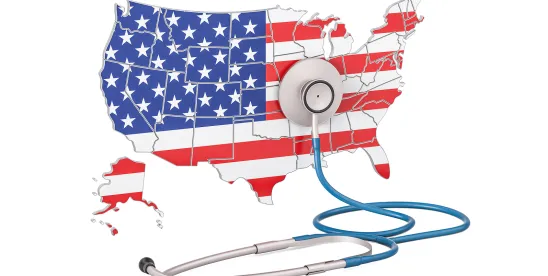THIS WEEK’S DOSE
- Republicans Win Control of White House and Senate, Seem Poised to Maintain Control of House. Former President Donald Trump will return to the White House, and Republicans also gained control of the Senate. Some toss-up House races have not been called yet, but Republicans appear to have won enough races to likely maintain House control.
- Senate Democrats Release Report on Prior Authorization Practices in MA. The report from Democrats on the Senate Permanent Subcommittee on Investigations analyzes prior authorization practices for post-acute care services in Medicare Advantage (MA).
- Senate Judiciary Committee Holds Field Hearing on Reducing Drug Prices Through Competition. The Chicago hearing featured testimony from Members of Congress, experts, and beneficiaries who voiced their concerns about anticompetitive practices and their desire to lower drug costs.
- Senators Release Medicare Site Neutral Payment Framework. The framework from Senators Cassidy (R-LA) and Hassan (D-NH) could inform work in the 119th Congress.
- CMS Finalizes CY 2025 Medicare PFS Rule. The Centers for Medicare & Medicaid Services (CMS) finalized a 2.83% reduction to physician payment rates under the 2025 Medicare Physician Fee Schedule (PFS).
- CMS Finalizes CY 2025 Medicare OPPS Rule. CMS finalized a 2.9% increase for both hospital outpatient and ambulatory surgical center payment rates.
- CMS Finalizes CY 2025 Medicare Home Health Prospective Payment System Rule. CMS finalized a 0.5% increase for home health agency payments.
- CMS Finalizes CY 2025 Medicare ESRD Prospective Payment System Rule. CMS finalized a change to the base payment for end-stage renal disease (ESRD) facilities to increase total payments by 2.7%.
- HHS, Labor, and Treasury Release Over-the-Counter Contraception Proposed Rule. If finalized, group health plans and individual issuers would be required to cover over-the-counter contraceptive items without cost sharing or a prescription.
THE ELECTION
Republicans Win Control of White House and Senate, Seem Poised to Maintain Control of House. Votes continue to be counted in several tight House and Senate races, but Republicans appear likely to have won a trifecta of control. Former President Donald Trump won all seven swing states and won the nationwide popular vote, handily defeating Vice President Kamala Harris. Republicans flipped Senate seats, including seats in Montana, Ohio, and West Virginia, to win control of the upper chamber. Republicans also won enough toss-up races and flipped several key seats in Pennsylvania and Michigan to likely maintain their majority in the House.
CONGRESS
Senate Democrats Release Report on Prior Authorization Denials in Medicare Advantage. The report from Democrats on the Senate Homeland Security and Governmental Affairs Committee, Permanent Subcommittee on Investigations, shares results from an inquiry launched in 2023. The report examines prior authorization practices, including denial rates for post-acute services care from 2019 to 2022, and discusses how post-acute care service denial rates were higher than denial rates for other services. The report breaks down denial rates by service category, including skilled nursing facilities, inpatient rehabilitation facilities, and long-term acute care hospitals.
The report recommended that CMS collect prior authorization data by service category, conduct targeted audits, and expand regulations on insurers’ use of predictive technologies in utilization management.
Senate Judiciary Committee Holds Field Hearing on Reducing Drug Prices Through Competition. The hearing was held in Chicago, Illinois, and the sole committee member present was Chair Durbin (D-IL). The hearing’s first panel included seven Democratic Members of Congress from Illinois, and the second panel included experts, lawyers, and a Medicare beneficiary. The representatives focused on the drug price negotiation and out-of-pocket cost cap policies included in the Inflation Reduction Act, and mentioned concerns about pharmacy benefit managers (PBMs). Witnesses highlighted the need for more affordable medications and expressed concerns about anticompetitive practices, citing a lack of transparency on drug pricing, PBM behaviors that influence the supply chain, and vertical integration of PBMs or insurers with pharmacies.
Senators Release Medicare Site Neutral Payment Framework. The framework from Senators Cassidy (R-LA) and Hassan (D-NH) includes two options for site neutral reforms: establishing site neutral payments either in off-campus hospital outpatient departments or for common outpatient services. The latter option is based on a proposal from the Medicare Payment Advisory Commission (MedPAC) and would include a reinvestment mechanism for rural and high-needs hospitals. The framework cites consolidation among hospitals and outpatient care settings, such as physician offices and ambulatory centers, as a driver of rising healthcare costs, as well as cost differentials among care settings. The framework could inform the direction of site neutrality policies in the 119th Congress.
ADMINISTRATION
CMS Finalizes CY 2025 Medicare PFS Rule. CMS finalized a 2.83% reduction to the calendar year (CY) 2025 conversion factor (CF) and a 2.2% reduction to the anesthesia CF. Anticipating the release of the final rule, a bipartisan group of 233 House members urged congressional leadership to include a physician pay fix for CY 2025 in a lame duck package and to update physician payment methodologies to reflect inflation. Other key policies in the final rule include:
- Add-On Code for Complexity: CMS finalized its proposal to expand the add-on code for complexity, G2211, by allowing it to be billed when the underlying evaluation and management service is performed on the same day as an annual wellness visit, vaccine administration, or any Medicare Part B preventive service furnished in the office or outpatient setting.
- Telehealth: CMS maintains that it has limited statutory authority to extend most Medicare telehealth policies. Without congressional action, the major Medicare telehealth waivers will expire on December 31, 2024.
- Merit-Based Incentive Payment System (MIPS): CMS will maintain the MIPS performance threshold at 75 points but signaled efforts to move reporting towards the MIPS Value Pathways by 2029.
- Medicare Shared Savings Program: CMS established a new prepaid shared savings option, created a health equity benchmark adjustment to encourage participation, aligned quality measure reporting with the Universal Foundation quality measures, and made adjustments to account for the impact of certain improper payments in program financial calculations.
- Health Equity: CMS finalized an add-on payment for conducting ongoing social determinants of health (SDOH) risk assessments, allowing initial visits for treatment with methadone to be provided virtually, and allowing audio-only periodic assessments.
The rule is effective on January 1, 2025. The CMS fact sheet can be found here, and the press release and additional issue-specific fact sheets can be found here.
CMS Finalizes CY 2025 Medicare OPPS Rule. CMS finalized a 2.9% increase to payment rates under the CY 2025 Hospital Outpatient Prospective Payment System (OPPS) and the Ambulatory Surgical Center (ASC) Payment System. This increase factor is based on a proposed hospital market basket percentage increase of 3% reduced by a productivity adjustment of 0.4%. In continuation of an existing policy, hospitals and ASCs that fail to meet their respective quality reporting program requirements will be subject to a 2% reduction in the CY 2025 fee schedule increase factor. Other finalized policies include:
- Maternal Health: CMS finalized new conditions of participation (CoPs) for obstetric services and emergency readiness but will phase in the new requirements over two years.
- Prior Authorization: CMS did not expand the categories of services subject to prior authorization but finalized a policy to harmonize the review timeline for non-urgent services and procedures.
- Non-Opioid Pain Treatment: CMS finalized its proposal to make separate payment for non-opioid treatments (including drugs and devices) for pain relief.
- Colorectal Cancer Screening: CMS finalized a policy to expand coverage of colorectal cancer screening tests.
- Health Equity: CMS finalized its proposals for new quality measures focused on health equity and SDOH and reviewed information on how to further address patient safety.
The rule is effective on January 1, 2025. The CMS fact sheet can be found here, and the press release on the CoPs can be found here.
CMS Finalizes CY 2025 Medicare Home Health Prospective Payment System Rule. CMS finalized a 0.5% increase for home health agency (HHA) payment for CY 2025 compared to CY 2024, an increase of $85 million. This represents an increase of 2.7%, a 1.8% decrease that reflects the permanent behavior adjustment, and a 0.4% decrease that reflects the updated fixed-dollar loss ratio for outlier payments. Other finalized policies include:
- CoPs: CMS finalized changes to HHA CoPs to require HHAs to develop, implement, and maintain a patient acceptance-to-service policy that addresses the anticipated needs of a referred prospective patient, the caseload and case mix, the staffing levels, and the skills and competencies of the HHA staff.
- Quality Reporting Program: CMS finalized four new items as standardized patient assessment data elements in the SDOH category of the quality reporting program.
- Expanded Home Health Value-Based Purchasing (HHVBP) Model: In the proposed rule, CMS issued a request for information on how to fill measurement gaps in the Expanded HHVBP Model. CMS may consider adding additional measures to the model in future rulemaking.
The rule is effective on January 1, 2025. The CMS fact sheet can be found here.
CMS Finalizes CY 2025 Medicare ESRD Prospective Payment System Rule. CMS finalized an update to the ESRD Prospective Payment System (PPS) that will increase payments to ESRD facilities by about 2.7% for CY 2025 compared to CY 2024. Other finalized policies include:
- Wage Index: CMS finalized a new ESRD PPS-specific wage index to adjust payments for geographic differences in wages. The methodology will be used to determine geographic payment adjustments in lieu of the hospital wage-index values for each geographic area.
- Outlier Policy: CMS finalized expanding the list of ESRD outlier services to include drugs and biological products that were or would have been included in the composite rate prior to the establishment of the ESRD PPS.
- Low-Volume Payment Adjustment Methodology: CMS finalized modifications to the low-volume payment adjustment so that ESRD facilities with fewer than 3,000 treatments per cost-reporting year will receive a 28.9% positive adjustment to the ESRD PPS base rate.
The rule is effective on January 1, 2025. The CMS fact sheet can be found here.
HHS, Labor, and Treasury Release Over-the-Counter Contraception Proposed Rule. The US Departments of Health and Human Services (HHS), Labor, and the Treasury propose to require group health plans and individual insurance issuers to cover recommended over-the-counter (OTC) contraceptive items without cost-sharing or a prescription. Currently, the Affordable Care Act requires plans and issuers to cover certain recommended preventive services without cost-sharing, but coverage of OTC services without cost-sharing is only required when there is a prescription from a provider. The proposed rules follow complaints the Departments have received about coverage of recommended preventive services and responses to a 2023 request for information on requiring coverage of OTC preventive products without cost sharing and without a prescription.
The Departments indicated that they plan to implement an incremental approach to OTC coverage of other recommended preventive services after implementing the OTC contraceptive coverage. Comments are due by December 27, 2024. The press release can be found here, and the fact sheet can be found here.
QUICK HITS
- CMS Issues Final Rule on Medicare Appeal Rights. The rule implements a federal court order to establish an appeals process for people in fee-for-service Medicare who were admitted to a hospital as an inpatient but were reclassified as an outpatient. The process aims to allow those individuals to appeal a denial of Part A benefits due to their reclassification. Read the fact sheet here.
- ACA Open Enrollment Begins. Open enrollment runs from November 1, 2024, to January 15, 2025. A fact sheet from the Biden Administration highlights policies the administration has adopted to improve affordability, choice, and enrollment.
- ASPE Releases Report on Healthcare Coverage in Rural Communities. The HHS Assistant Secretary for Planning and Evaluation (ASPE) report highlights how uninsurance rates in rural areas have declined over the past 10 years but remain higher than in urban areas. Read the press release here.
- CMS Announces Rhode Island, Part of New York Will Participate in AHEAD Model. Rhode Island and five counties in southern New York will constitute cohort three of the States Advancing All-Payer Health Equity Approaches and Development (AHEAD) Model. The 24-month pre-implementation period will begin in January 2025. Cohort three’s first performance year will begin in January 2027 and run for eight performance years.
- ARPA-H Announces $110 Million in Awards for Women’s Health Research. The Advanced Research Projects Agency for Health (ARPA-H) will award $110 million to 23 awardees for its Sprint for Women’s Health to increase private sector innovation in women’s health. Read the press release and the list of awardees here.
- FCC Votes to Georoute 988 Wireless Calls. The Federal Communications Commission (FCC) vote will require wireless carriers to implement georouting for calls to the 988 Suicide and Crisis Lifeline, to help connect callers to local crisis centers. The FCC proposes to require the same policy for text messages.
- CMS, CFPB Remind Medicare Providers of Beneficiary Billing Requirements. CMS and the Consumer Financial Protection Bureau (CFPB) reminded Medicare providers that they are prohibited from billing qualified Medicare beneficiaries for cost-sharing. The agencies urged providers, medical billers, and debt collectors to examine their practices to ensure compliance.
- CBO Report Analyzes Budgetary Impact of Medicare GLP-1 Coverage. According to the Congressional Budget Office (CBO) report, Medicare coverage of anti-obesity medications such as glucagon-like peptide 1 (GLP-1) medications would increase federal spending by $35 billion from 2026 to 2034. Total savings over the same period would be $1 billion.
- Democratic Committee Leaders Express MA Concerns. Senate Finance Committee Chair Wyden (D-OR), House Energy and Commerce Committee Ranking Member Pallone (D-NJ), and House Ways and Means Committee Ranking Member Neal (D-MA) sent a letter to CMS expressing concerns about prior authorization, marketing, and broker practices by MA plans. They ask CMS for a briefing on how the agency is cracking down on MA practices, to occur by December 15, 2024.
- Bipartisan Members of Congress Urge DEA to Extend Telehealth Flexibilities for Controlled Substance Prescribing. Two congressional letters were sent to the US Drug Enforcement Administration (DEA) and the White House, urging an extension of COVID-19 regulatory flexibilities, set to expire at the end of the year, that have allowed for telemedicine prescribing of controlled substances. Read the letter from 11 senators here, and read the letter from 18 representatives here.
- GAO Releases Report on Medicaid Coverage of Menstrual Products. The US Government Accountability Office (GAO) report analyzes how Medicaid managed care plans in 25 states are optionally covering menstrual products and other OTC personal items.
- CMS Approves Medicaid Coverage of Traditional Healthcare Practices in Four States. CMS approved Medicaid Section 1115 demonstration waivers in Arizona, California, New Mexico, and Oregon to cover traditional healthcare practices provided by Indian Health Service facilities, Tribal facilities, and urban Indian organizations. Read the press release and approval letters here.
- MACPAC Holds October 2024 Public Meeting. The Medicaid and CHIP Payment and Access Commission (MACPAC) agenda included sessions on medications for opioid use disorder, provisional plans of care for home- and community-based services, multi-year continuous eligibility for children, youth use of residential treatment services, policy options on managed care external quality review, transitions of care for children and youth with special healthcare needs, and directed payments in managed care. Slides are posted here.
- MedPAC Holds November 2024 Public Meeting. The MedPAC agenda included sessions on reforms to the PFS, participation bonuses for advanced alternative payment models, market differences between fee-for-service prescription drug plans and MA prescription drug plans, a workplan for MA provider networks, and Medicare’s coverage limits on freestanding inpatient psychiatric facilities. Slides and a transcript will be posted here.
NEXT WEEK’S DIAGNOSIS
Congress returns on November 12, 2024, to begin the lame duck session. The main agenda items are passing an end-of-year package before the December 20, 2024, government funding deadline; passing disaster relief funding in the wake of hurricanes Helene and Milton; and conducting leadership elections for the new Congress. The size and scope of an end-of-year package remains to be seen. It could be as little as a three-month continuing resolution moving the deadline to March 2025 after President Trump is in office, or it could incorporate a full-year package. Healthcare extenders are likely to ride this package, and additional health policies that have bipartisan support and low price tags could also be in play for inclusion.








 />i
/>i
